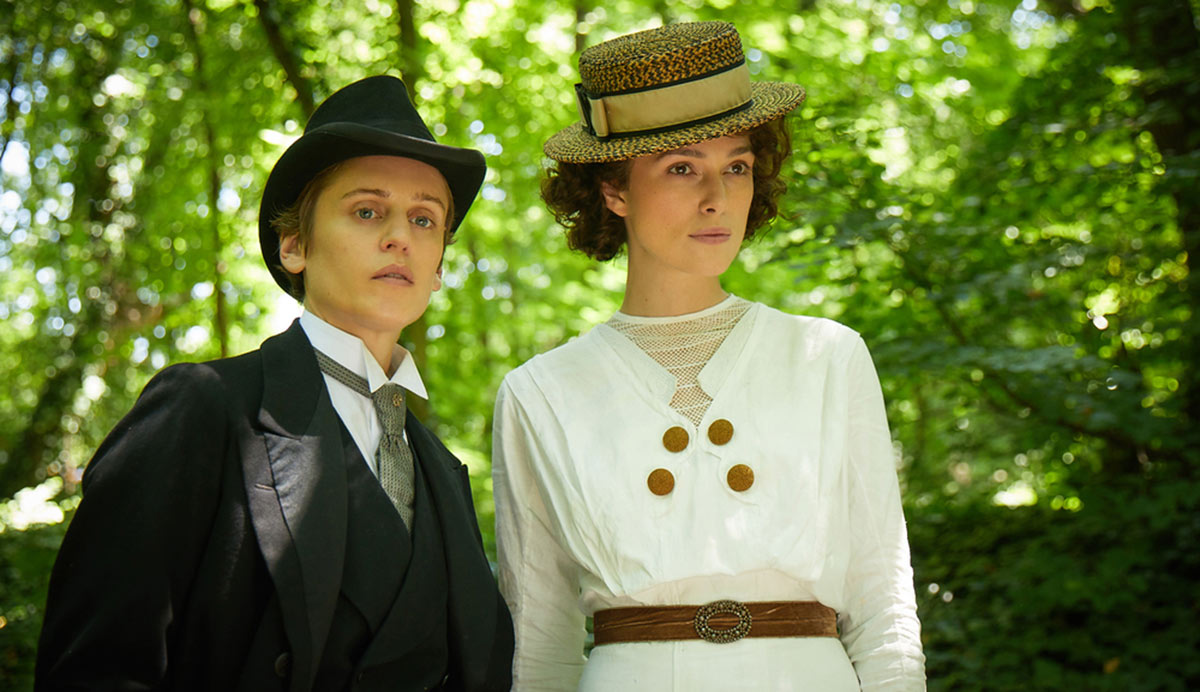Focusing on Sidonie-Gabrielle Colette, the Parisian author responsible for her husband’s literary success, Wash Westmoreland‘s “Colette” features a towering performance from Keira Knightley, who plays the legendary writer with such warmth and fiery feminism, with a story that easily draws parallels with today’s world.
Colette’s marriage to the well-off Willy (a slyly playful and equally up to the task Dominic West), is a challenge to both her feminist ideals and definition of what love truly means. He is an author of somewhat limited talent that takes his wife’s ideas to write about the fictional Claudine, a character filled with sexual freedom and uproarious adventures that spark a fury in the French literary world. Of course, after the initial success, Willy wants more books to be written, and endeavors to build not just an empire around this promiscuous and daring female character, but to solidify the literary reputation he’s been craving for years.
“Colette” is about a strong woman trying to separate herself from the pack and explores the gender inequalities of the time. Knightley nails her performance down with the kind of passion and attention-to-detail not many actresses can exude on-screen. The continuous evolution of Colette requires subtle and nuanced changes in this demanding role and Knightley more than meets the challenge with some of the most exhilarating work of her career.
Recently, I had the opportunity to speak with Knightley about the film, the feminist messages at its center, and the “Colette’s” similarities to society today.
Did you know about this fascinating story before taking the role?
I didn’t. I think I was aware of the images of her later in life, where she has the crazy red hair and the eye makeup. I’d seen “Gigi,” the musical, but I didn’t know about her. So, reading the script and finding out about that first marriage you are just telling yourself, “This is mental.” She was just this fascinating creature and the work the film is based on is also so wonderful. So, having the book, which is her voice, that’s great to have for a resource as an actress. You get to know the woman through her work and that was a joy as well. When I read this script I went, “Oh I need that, I need to see that.”
And similar stories were happening hundreds of years later, we saw it this year with “The Wife,” about a man taking over the woman’s voice.
Well, I think what’s interesting about these stories, and I’ve heard about it but haven’t seen “The Wife,” is that it’s such an extreme version of what women feel anyway. You know, how you feel voiceless and in these stories, the men take credit over the woman’s work, with Colette he took credit for the four novels which is just insane when you think about it. So, that’s what I liked about it, that it’s an extreme version, but it’s a reality that most women look at and go “I recognize that” in some way. The female voice is often obliterated by the male one, and … that shouldn’t happen [laughs].
Especially in this day and age, you would think that similar stories such as Colette’s would not be happening today.
I know, but you probably … never know? I mean, you read a script that is set 100 years ago, and it’s talking about gender politics, it’s talking about sexual politics, it’s talking about feminism, it is basically talking about everything we’re talking about right now. The conversation needs to keep going on, we need to figure this shit out, we need to keep the fire lit.
Did you read anything to get invested into this crazy world Colette was living in?
We all read Judith Thurman‘s autobiography “Secrets of the Flesh,” she’s great, and what I realize is that Colette’s life, you could make a whole mini-series from it. Also, reading Colette’s Claudine novels, which were somewhat autobiographical, you could get a sense of her voice through his pen name, but she as a character was true to herself which is super rare for anyone, even today. She knew who and what she was and that’s the story of this film. Colette finding her voice, finding herself, and the fact that she did it so courageously that stepped out of this huge shadow from Willy, who was a massive chauvinist, but very famous and very successful and a big star, that could swallow up anything around him. So, the fact that she had a big enough sense of self that was like “Alright, I’m carving this space for myself, I’m making a hole in the world for me” was moving.





